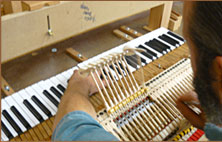Piano Voicing & Regulation for Improved Piano Tone
Before a tuning, I chat with a piano owner. They often confide that they no longer play their piano as much as they used to, and seem sad about that. Then I listen to the piano. It sounds explosive, metallic or just plain hurts.
I point out that the reason they don’t play much any more is that the sound of their piano is, to put it candidly, quite unpleasant. “Let me show you how I could make this sound much nicer,” I say.
So, on a couple of sample notes, I do a quick partial regulation and voice a couple of hammers. The tone begins to lose its harshness, the jangle reduces, and it begins to sound musical again.
Piano hammers wear and harden. The hammers wobble as they swing on their pivots. Action screws loosen and parts no longer swing true. Keys become too tight to pivot. Felts compress. Hammers bobble. Touch is inconsistent. Hammers strike too far from the strings. Notes don’t play… in short, the piano is a complex machine which needs regular service in order to make playing enjoyable.
Voicing and regulating the action are basic service requirements beyond tuning. They keep your piano sounding and playing nicely.
Voicing adjusts the tone of the instrument.
Regulation addresses the mechanical functioning of the keys and action.
I offer these services, and tailor them to the client’s wishes and budget. It is surprising how sometimes just a little voicing and regulation after the regular tuning can completely transform the sound of the instrument.
The price for these services is quoted hourly at $70/hr. Most often I suggest 1 or 2 hours of service work following the regular tuning, as part of a “Full Service” tuning. But successful improvements can also be obtained with an occasional or one-time 1-2 hours of voicing with minor regulation/repairs.
See article: Piano Tone Regulation
Grand Piano Solutions ~ piano restoration and services
978-305-4692
serving Greater Boston, Central Massachusetts and New England
41 Parker Rd Shirley, MA 01464 ©2009

